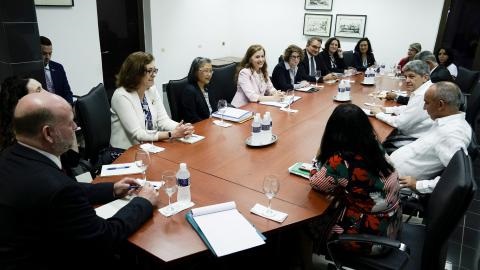
Deputy Minister Carlos Fernández de Cossío received at the Ministry of Foreign Affairs Rena Bitter, Assistant Secretary of the Department of State for Consular Affairs, and Ur Mendoza Jaddou, Director of Citizenship and Immigration Services of the United States Department of Homeland Security.
During the exchange, the Cuban representative reiterated the importance of fully resuming immigration and consular services at the US Embassy in Havana, including the processing of non-immigrant visas.
He also confirmed the willingness to contribute with the necessary steps for the full functioning of the migratory and consular services of the diplomatic headquarters.
The US embassy in Cuba announced on May 6 that it would resume limited processing of immigrant visas that month, after almost five years without consular services under a pretext discarded by scientists and official reports.
On March 3, the diplomatic mission notified about the preparations to resume activities in this capital, paralyzed by the so-called "Havana Syndrome", rejected by scientists and even reports from the US State Department.
Under the mandate of Republican Donald Trump (2017-2021), the legation reduced its staff to a minimum in September 2017 on the grounds of mysterious "sonic aggressions" and alleged "health incidents" of diplomats, even though Cuba from the beginning denied any attack and remained willing to cooperate in the investigations.
Authorities from the largest of the Antilles denounced that in reality the accusation was part of a political operation to reverse advances in the ties between Cuba and the United States given during the administration of Barack Obama (2009-2017).
Without a definitive weapon, motivation or authors before the accusation, the embassy here witnessed the suspension of the family reunification program and the granting of visas, aspects that directly affected citizens of both countries and not the Antillean Executive as the North American rhetoric intended.
In addition, although in the 1984 migration agreements the United States promised to grant at least 20,000 visas per year, in recent years it has only delivered about 4,000 each year, according to the Caribbean Ministry of Foreign Affairs.
In the last five years, Cubans have been forced to go to third countries for all their procedures, which increases costs and without certainty of approval, and there are those who bet on irregular migration that puts lives in danger.
